Diabetes claims are for negligence in the treatment and diagnosis of diabetes. Your doctor should notice the symptoms and refer you for diagnosis after testing.
According to NHS figures on diabetes, nearly four million people are living with diabetes in the UK. The majority of those people with diabetes are managing the condition and living with their diabetes.
Unfortunately, there are also those living and suffering from undiagnosed or poorly treated diabetes
People who make diabetes claims for negligence are the ones who did not get diagnosed when they should have and those who have experienced medical negligence in their care.
If you have had a misdiagnosis of your diabetes or have received negligent medical care for the condition, you can make a diabetes claim for negligence.
A No Win No Fee medical negligence solicitor will handle your diabetes claim and get you the money you deserve.
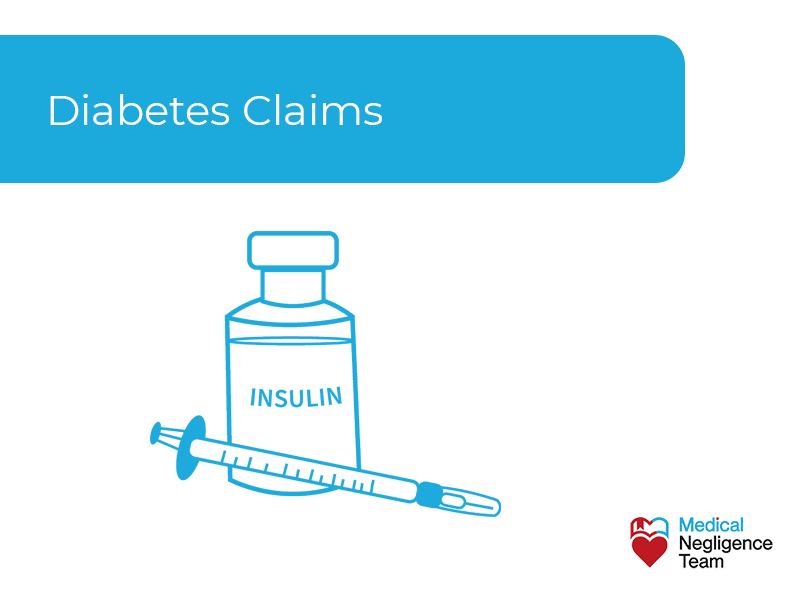
Table of Content
What is Diabetes negligence?
Diabetes negligence is when you receive medical care below that which any medical professional would provide. It is diabetes negligence when you receive medical care below acceptable standards that directly impacts your health.
If you go to the doctor with the symptoms of diabetes and they fail to diagnose your condition, it is diabetes negligence. When a doctor does not prescribe you the correct medication, it is diabetes negligence.
Ambulance paramedics and A&E doctors, and nurses are trained to recognise the effects of diabetes. When they fail to treat you correctly, it is diabetes negligence.
With any form of diabetes negligence, your health will suffer.
You can make a claim for diabetes negligence, and a No Win No Fee medical negligence solicitor will handle your case.
What is Diabetes?
Diabetes is a disease where your blood sugar levels become too high. It is a lifelong condition, and diabetes will damage your health if not treated correctly.
Your body breaks down the food you eat into glucose which enters the bloodstream to be converted into energy, which in turn is transferred to your cells. The blood sugar levels are controlled by insulin, which you produce in the pancreas.
If your body does not produce enough insulin or insulin of insufficient quality, the blood sugar levels can go too high.
When you cannot break down the blood sugar levels to feed your body, you will become sluggish and suffer the symptoms of your type of diabetes.
What are the types of diabetes?
The types of diabetes in the UK are Type 1 diabetes and Type 2 diabetes. Pregnant women can also develop gestational diabetes, which usually disappears after childbirth.
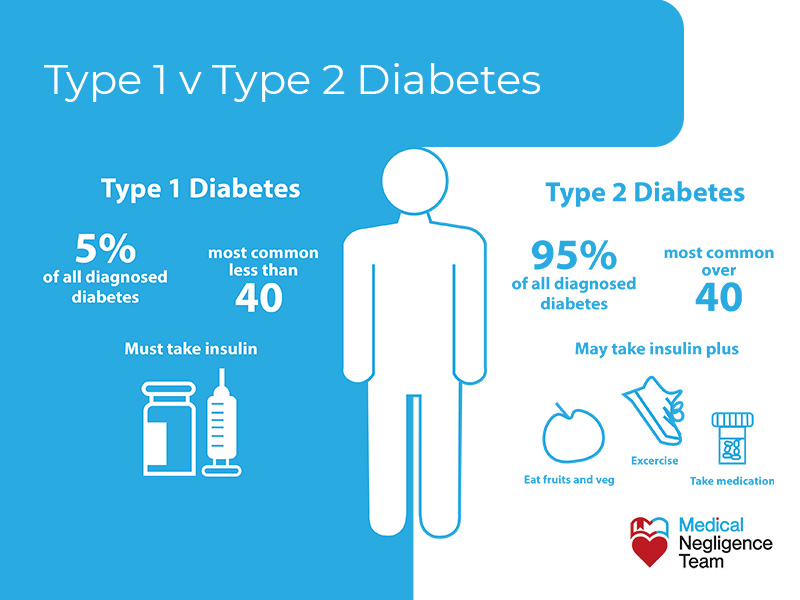
Type 1 diabetes
Type 1 diabetes is when your pancreas makes too little or no insulin. Without producing the correct amount of insulin, your body cannot control your blood sugar levels.
Once known as juvenile diabetes or insulin-dependent diabetes, Type 1 diabetes is a life-long condition with no known cure. Type 1 diabetes is usually diagnosed at a young age but can also develop in adulthood.
Treatment for Type 1 diabetes includes trying to stabilise insulin levels, lifestyle adjustments, and a healthy diet.
Type 2 diabetes
Type 2 diabetes is when the blood sugar levels become too high or difficult to manage. It is caused by either the body not producing enough insulin or by not correctly using the insulin it does produce.
A family history of diabetes, a bad diet and lack of activity are all indicators of developing Type 2 diabetes. It is a lifelong condition, and the symptoms can arise at any age.
You may need to take diabetes medications to manage Type 2 diabetes, but changes in diet and staying active can be very successful in treating the condition.
Gestational diabetes
Gestational diabetes starts during pregnancy, and your body cannot manage your blood sugar levels, which can become too high.
Treatment for gestational diabetes is usually by adjusting your diet and exercising more, but for some patients, medications are prescribed.
In most cases, your blood sugar levels will return to normal levels after the birth of your child.
If left untreated, gestational diabetes can cause damage to you and your baby. In some women, gestational diabetes can develop into Type 2 diabetes.
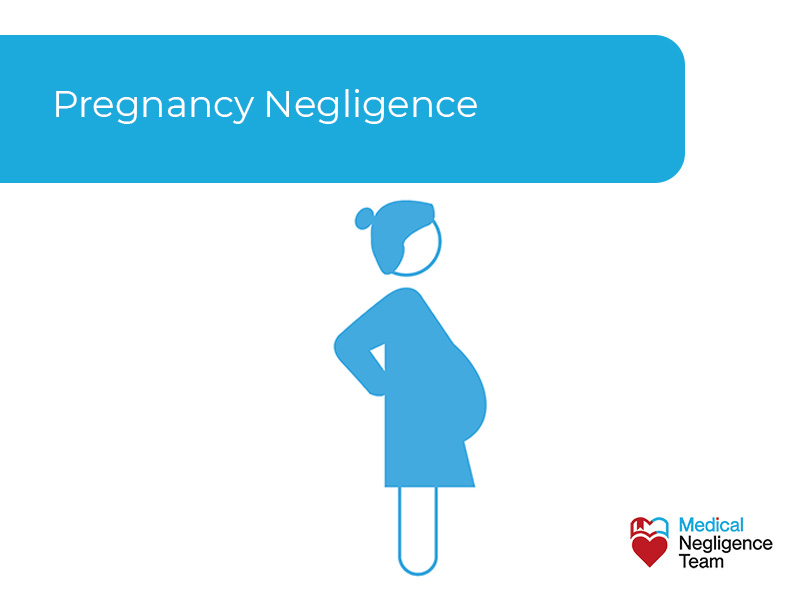
What are the symptoms of diabetes?
The symptoms of diabetes include tiredness and being constantly thirsty. Your doctor should recognise the signs of diabetes, and the symptoms should be familiar if you have a family history of the condition.
Symptoms of Type1 diabetes and Type 2 diabetes are:
Other symptoms, such as suffering from thrush or sudden bed wetting in children, may also lead to a diagnosis of diabetes.
If you are concerned or have one or more of the symptoms of diabetes, you should see a doctor.
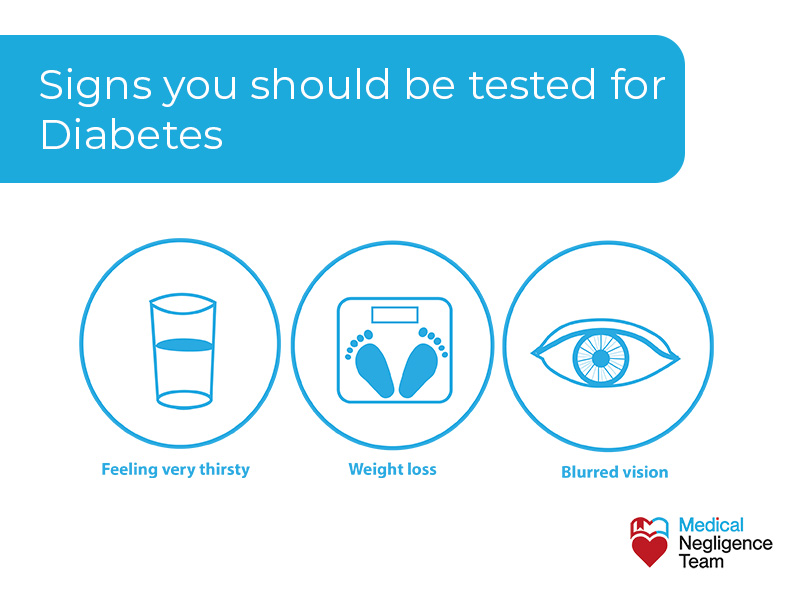
When should you visit a doctor to see if you have diabetes?
You should visit a doctor to see if you have diabetes when you notice one or more of the symptoms of diabetes affecting your daily routine.
If you are a parent of a child with potential diabetes, you should keep a close eye on symptoms and not delay seeing a doctor.
In Type 1 diabetes, symptoms can develop during childhood and adolescence. It is not linked directly with age or lifestyle, and reporting any symptoms to your doctor is vital for a prompt diagnosis.
Family history can be a factor in Type 2 diabetes. Other risk factors, such as being obese and your age, can be indicators of Type 2 diabetes.
Seeing a doctor is very important once you spot any of the symptoms of diabetes and recognise any ill effects on your health.
Your doctor should diagnose your diabetes, refer you for further tests and put you on a treatment plan.
Failing to do so is medical negligence, and you may have a diabetes claim for compensation.
What is prediabetes?
Prediabetes is when you are showing early signs of developing the disease. Checking for signs of diabetes is very important when there is a family history of developing the condition.
A simple urine test can show increased levels of indicators and will tell your doctor if you are at risk of developing diabetes. If you are overweight and have problems with exercising, your chances of developing diabetes increase.
Referring you for further tests or advising you of lifestyle changes can affect your diabetes and may even lessen the long-term effects.
It is vital that your doctor, knowing your health history, checks you for early signs of diabetes. Failing to recognise or test for prediabetes can be diabetes negligence.
Who is responsible for Diabetes negligence?
A medical professional is responsible for diabetes negligence. Failing to test for and diagnose diabetes is diabetes negligence.
Diabetes negligence can also happen when you are diagnosed with diabetes but are not put on a proper treatment plan.
If you have a family history of Type 2 diabetes and your GP does not test you for it, then it is diabetes negligence.
When you have an emergency admission to A&E with one or more symptoms of diabetes, but they fail to test and diagnose the condition, you will have a diabetes negligence claim.
Early intervention can slow the development of diabetes, particularly Type 2 diabetes.
Failing to prescribe medication and not advising on lifestyle changes will only worsen the condition.
Failing to refer you or a loved one for further testing and treatment is diabetes negligence.
In Type 1 diabetes, your doctor should send you straight to hospital for further blood tests and consultation with the diabetes team.
Advising you on lifestyle changes, proper use of medication, and the effects of diabetes is vital for the proper management of your condition. Failure to do so is diabetes negligence.
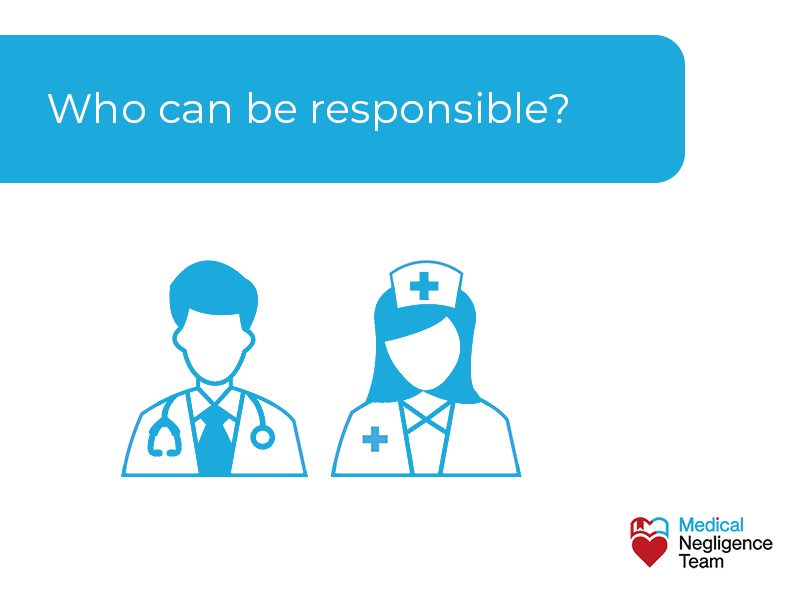
What are the effects of receiving poor diabetes care?
The effects of receiving poor diabetes care include the condition getting worse and your body suffering a lot of ill health.
Diabetes negligence, failing to diagnose or treat the disease, will have lasting effects on you or a loved one.
Some of the effects of diabetes negligence are:
Diabetes negligence compensation
You can claim significant amounts for diabetes negligence. Other amounts, such as more than £150,000, are seen for the loss of your kidneys when diabetes is undiagnosed and untreated.
There is not one fixed amount awarded in diabetes negligence cases. As in all medical negligence claims, each case is dealt with on its merits and how much you have suffered due to undiagnosed diabetes.
A No Win No Fee medical negligence solicitor will be the only one who can advise you on a diabetes negligence claim. They will know from experience what your case may be worth and how to go about a successful claim
Your No Win No Fee medical negligence solicitor will handle your diabetes negligence claim and get you compensation for all damages incurred.
What can you claim for when suing for diabetes negligence?
You can claim compensation for any damages that occurred when suing for diabetes negligence.
There are two types of compensation damages due when suing for any type of medical negligence: General damages and Special damages.
You deserve compensation to cover all losses, including loss of life, medical costs and any long-term care needs.
When you or a loved one suffers from the effects of diabetes negligence, you make a claim for compensation.
Your No Win No Fee solicitor will guide you through the steps in making a diabetes negligence claim.

How to make a medical negligence claim
The steps involved when making a claim for diabetes negligence are a part of any successful compensation case. When you follow them correctly and get all the facts and figures together, your medical negligence solicitor will do the rest.
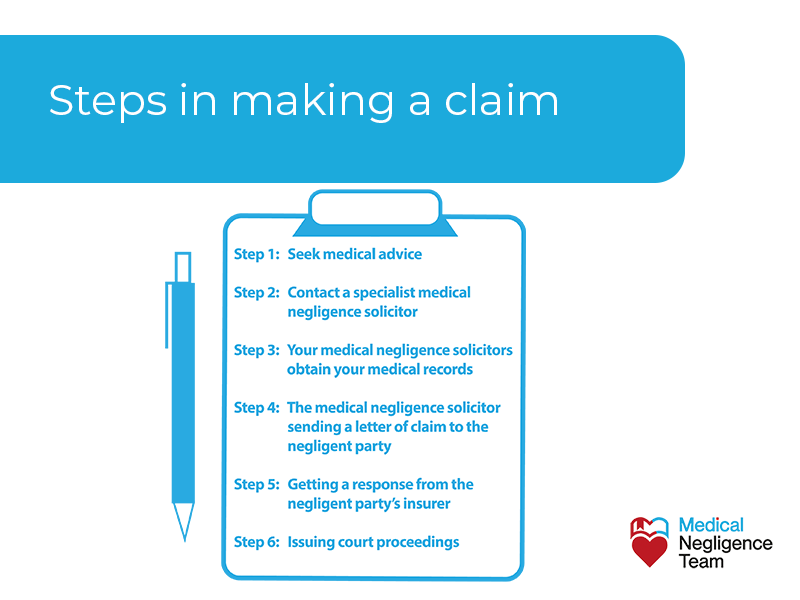
Our Process
Our team members have a higher career win rate with a 75% success rate on NHS letters of claim, compared to an industry average of 54.5%.
Enquiry
The first step is to get in touch and tell us what went wrong. It’s free and easy. Call our 24-hour helpline: 0800 246 1122 or request a callback here.
Medical Evaluation
Once you have spoken with our team we’ll let you know how we can help. Typically the next step is to obtain your medical records for us to review.
Legal Letter
Once all your medical records have been received they will be reviewed by a medically & legally qualified member of our team. If there is evidence of negligence we will send a letter of claim to the negligent party outlining your compensation claim.
Using a No Win No Fee solicitor
Using a No Win No Fee solicitor is the only way to a successful diabetes negligence claim. Your No Win No Fee medical negligence solicitor will not charge you for a claim you do not win.
Always have a fee agreement in place before engaging a medical negligence solicitor. If they start talking of a ‘win fee’ or a ‘success fee,’ you should walk away. The negligent party insurers should pay all fees.
The medical negligence solicitor should also operate a 100% Compensation Guarantee scheme. When you win the case, all the money awarded should go to you, not the solicitor.
You are the one who suffered diabetes negligence, and you deserve the compensation to get your life back to normal.
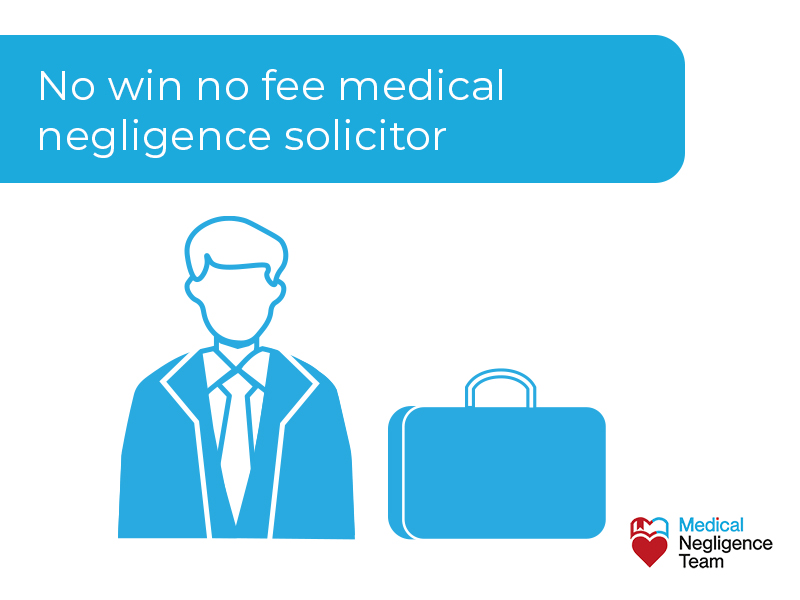
How long do I have to make a claim for diabetes negligence?
You have three years to make a claim for diabetes negligence. All medical negligence claims are subject to limitation periods.
For example, in England and Wales, medical negligence claims must generally be brought, court proceedings issued within three years of the injury, or three years of knowledge of the facts giving rise to the claim.
If someone has passed away, it is the date of death if the limitation period has not expired at the date of death.
Children not under a disability typically have until they reach 21 to start a diabetes negligence claim or court proceedings.
Persons under a disability, who lack capacity, are not subject to any limitation period.
Can I make a medical negligence claim against the NHS?
Yes, you can make a medical negligence claim against the NHS. Suing the NHS for negligence is not unusual. People sue the NHS for compensation for medical negligence and receive the money they deserve for the negligent treatment.
Each year there are between 8,000 and 10,000 successful medical negligence claims against the NHS. Suing the NHS for medical negligence can make some people feel uncomfortable.
Amounts in compensation claims awarded against the NHS range from £1000 to over £10 million. The amount you receive covers minor injuries such as scarring to serious life-threatening negligence, which leaves you with long-term care needs.
We trust in and use the NHS daily and do not expect negligence. It happens, though, and the NHS has a dedicated team to handle medical negligence compensation claims, called NHS resolution.
NHS Resolution has a responsibility to treat patients who seek compensation fairly. Patients pay for the NHS through their taxes, and for that they deserve respect and the best medical treatment.
Contact The Medical Negligence Team
Contact the Medical Negligence Team today to discuss your diabetes negligence claim for compensation. We have both the legal and medical experts to guide you along the steps to a successful medical negligence claim for compensation.
At the Medical Negligence Team, we fight every compensation claim on a No Win No Fee basis. You will not be out of pocket for an unsuccessful claim.
We have a very high success rate and a reputation for a speedy and successful resolution to all medical negligence cases.
Our 100% Compensation Guarantee puts all the money you win into your pocket. You or your loved one suffered diabetes negligence, and you deserve every penny of the compensation.
Contact us at the Medical Negligence Team for all your medical negligence needs.


